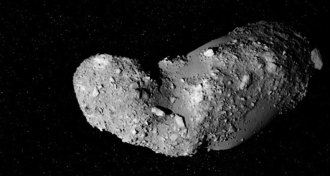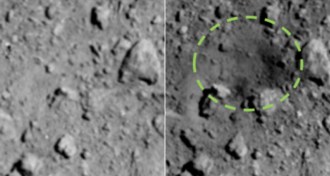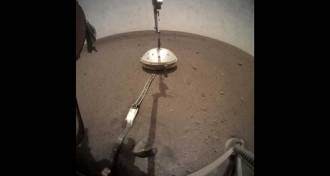Space
Sign up for our newsletter
We summarize the week's scientific breakthroughs every Thursday.
-
 Ecosystems
EcosystemsReaders were curious about green icebergs, aliens and more
Readers had questions and comments about icebergs and climate change, CBD and NASA’s search for E.T.
-
 Astronomy
AstronomyDying stars called collapsars may forge much of the universe’s gold
Spinning stars that collapse into black holes could help explain the origins of heavy elements such as gold and silver.
-
 Physics
PhysicsWhat a nearby kilonova would look like
Physicists imagined what we’d see in the sky if two neutron stars collided just 1,000 light-years from Earth.
-
 Physics
PhysicsLIGO is on the lookout for these 8 sources of gravitational waves
Gravitational wave hunters are on a cosmic scavenger hunt. Here’s what they’re hoping to find.
-
 Physics
PhysicsLIGO and Virgo made 5 likely gravitational wave detections in a month
It took decades to find the first gravitational wave event, and now they’re a weekly occurrence.
-
 Planetary Science
Planetary ScienceWater has been found in the dust of an asteroid thought to be bone-dry
Scientists detected water in bits of an asteroid thought to be devoid of the liquid. Such space rocks might have helped create Earth’s oceans.
-
 Astronomy
AstronomySkepticism grows over whether the first known exomoon exists
New analyses of the data used to find the first discovered exomoon are reaching conflicting results.
-
 Planetary Science
Planetary SciencePictures confirm Hayabusa2 made a crater in asteroid Ryugu
Hayabusa2’s crater-blasting success, confirmed by an image beamed back from the spacecraft, paves the way to grab subsurface asteroid dust.
-
 Planetary Science
Planetary ScienceNASA’s Mars InSight lander may have the first recording of a Marsquake
NASA’s InSight mission appears to have detected a Marsquake for the first time.
-
 Astronomy
AstronomySeeing very far away and hitting closer to home
Editor in Chief Nancy Shute discusses the first-ever image of a black hole and what can be done to help young children with anxiety.
By Nancy Shute -
 Planetary Science
Planetary ScienceReaders ponder Opportunity’s future, animal consciousness and more
Readers had questions about NASA’s Opportunity rover, pollen shapes and more.
-
 Planetary Science
Planetary ScienceMercury has a massive solid inner core
The distribution of Mercury’s mass and small stutters in the planet’s spin suggest it has a giant solid inner core.